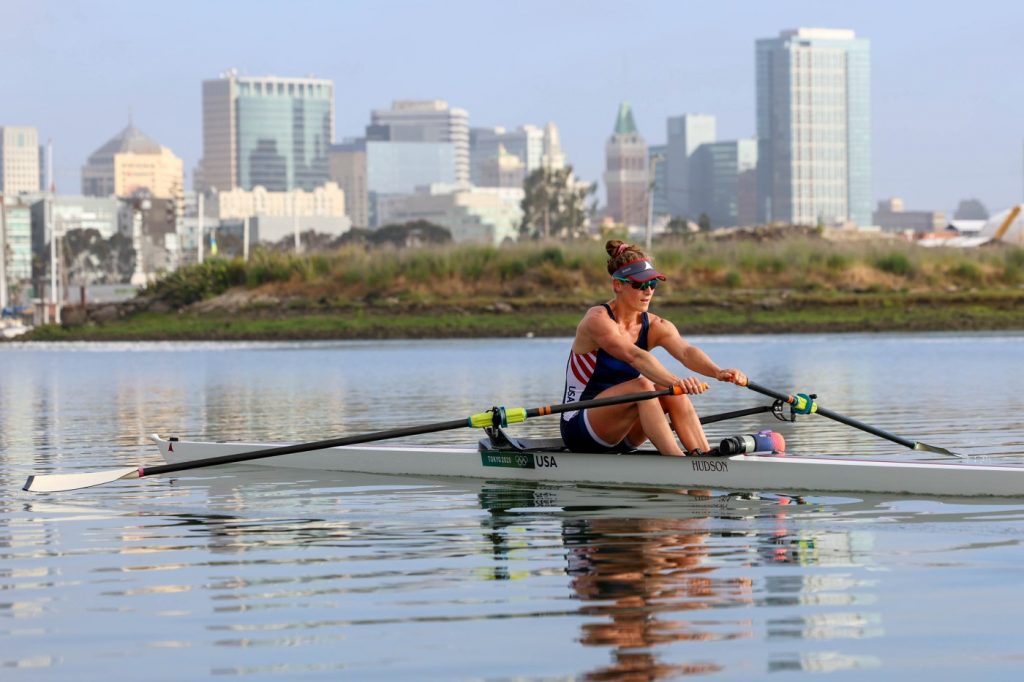When it all fell apart, Kara Kohler moved back in with her parents.
Up until that point, every major decision in her 25 years of life had a singular purpose, to help her be the most effective and efficient athlete she could be and get her to the Olympics, her dream since she was a child in her Clayton home.
In 2012, Kohler stunned the rowing world — and herself — when she won a bronze medal at the London Olympics just three years after taking up the sport. But in 2016, she was left off the Olympic roster for Rio. U.S. Rowing cut her funding. She had no income. No bank account. No direction.
“When you rise that high, you can fall pretty far,” she said. “I was too heartbroken to continue.”
Broke and confused, that’s when she met Jack Woll, a high school junior at The College Prep School in Oakland who became her mentee, eventually inspiring her return to competition which has led her back to the Olympics in Paris this summer.
“That gave me inspiration,” Kohler said. “It doesn’t take much to inspire people.”
Olympic rower Kara Kohler practices along the Oakland Estuary on June 7, 2024. (Ray Chavez/Bay Area News Group)
When Woll first met Kohler in 2016, he didn’t know how alone she was feeling.
He knew her as a superstar in the rowing world.
He knew her as a walk-on at Cal who never held a paddle until her freshman year, two years later won an Olympic bronze medal and then returned to Cal to lead the varsity eight to the NCAA championship.
“At the time I was feeling low about myself but he didn’t see that,” Kohler said. “He’s like, ‘Wow you’re so accomplished.’”
She was “a remarkable athlete,” Woll said, the perfect example of someone who can achieve anything they set their mind to.
Woll wanted to be coached by her.
Kohler needed a job.
“Coaching turned out to be more multi-dimensional than I thought,” she said. “It was a symbiotic inspirational loop.”
She invited Woll to the Cal Rowing Club, where, for an entire summer, they’d sit side-by-side in the erg rooms and practice on rowing machines, simulating the stroke over and over, studying video and fine-tuning the technical details.
“I think she did a really wonderful job of showing me how to love the process in a different way than I had been taught,” Woll said. “She taught me how to be internally focused, understand how days fit into weeks, into months, and understand where the important days were, what day-to-day variation meant in performance, and what it was like to be trending toward the goal.
“It served me well. We ended up winning a national championship with the Oakland Strokes at the end of my senior year.”
Kohler gained something, too.
“He was so diligent and had so much enthusiasm for getting better that it definitely rubbed off on me,” she said. “I was like, ‘OK, this is what it’s like to have joy for a sport.’”
She helped guide Woll to a spot on the Princeton rowing team, then made a decision for herself: She wanted to give her career another chance.
“I realized I could inspire people with my journey,” she said.
The hardest part was adapting.
Kohler had earned an Olympic spot in 2012 because she was a strong athlete with incredible endurance that would help an eight-person boat.
But she wanted to earn her way to the Tokyo Olympics as a single rower, which required more finesse and feel. And without a group of friends to support her on the water, an incredible amount of self-motivation was required.
Olympic rower Kara Kohler takes a short break during practice along the Oakland Estuary on June 7, 2024. (Ray Chavez/Bay Area News Group)
“Rowing the single is not for the faint of heart,” said 41-year-old Meghan Musnicki, who this summer will become the oldest American woman ever to row at an Olympics. “It is an incredibly competitive event. It’s you and only you in that boat on race day. Kara has been like Kara does, just taking it in stride, and it’s been a lot of fun watching her.”
Kohler entered the 2017 world championship trials and needed to win to make it to the finals. She finished in second.
She considered her options and thought she’d try one more time.
“I felt like if I could train in it for the fall and spring, I could be a lot better,” she said. “That’s what I did.”
The following spring, she registered for world championship trials again needing to win the race to qualify. This time she won, finishing two seconds before Olympian Felice Mueller, the same rower who had beaten Kohler the previous year.
“I thought I might have peaked in the sport in London,” Kohler said. “It’s laughable to think about that now. It’s just that success skewed my relationship with rowing.”
Her win in 2018 helped her solidify her spot on the US Rowing team. She’s been the women’s single rower every year since, including a return to the Olympics in Tokyo in 2021, when she missed the A-final by less than a second.
She punched her ticket to Paris this summer and last week returned to the national team training facility in Princeton, where she now struts through the campus “more confident and assured of what she’s doing,” said Adrienne Martelli, who rowed with her at the Olympics in 2012. “I’m really excited for what’s to come for her.”
This summer’s games could be the last for Kohler, now 33, as she attempts to become the first American woman ever to win a gold medal in rowing.
Olympic rower Kara Kohler of Clayton looks on at the California Rowing Club before heading to practice along the Oakland Estuary on June 7, 2024. (Ray Chavez/Bay Area News Group)
Her expectations are simple: have the best race she can possibly have and let the chips fall where they may. She’s learned to let go of the pressure she once put on herself after earning Olympic glory at 20 and nearly quitting the sport at 25.
“Your path might change a little from what you thought, but there are life lessons in there, too,” she said.
“She has incredible resilience and attitude,” Martelli said.
There’s a moment Jack Woll still thinks about when he was a freshman on the Princeton rowing team and competing in his first 6,000-meter race on a boiling summer’s day.
He was sweating puddles and still had about 2,000 meters to go when he thought he heard a familiar voice.
Related Articles
Other cities can’t compete with Tracktown USA
2024 Paris Olympics: Former Cal golfer Collin Morikawa to play for Team USA
Ralph Lauren goes with basic blue jeans for Team USA’s opening Olympic ceremony uniforms
The Olympics are more than fun and games. They’re a billion-dollar business with political overtones
Big night for U.S. stars at swim trials as Ledecky, Murphy and King win
“I thought to myself, ‘Is that Kara?’” he said. “I took the last stroke, looked behind me and I thought, ‘I am either hallucinating or Kara is talking to me and patting me on the back.’ It was Kara.
“My coach was like, ‘You have a big fan here, Jack.’”
Woll went on to have a successful rowing career at Princeton and still considers Kohler a mentor, a “very important person in my life.”
When she takes the boat in France next month, he’ll be watching on TV, hoping she remembers that no matter how difficult the challenge, she’s never alone.
“So much of the training is by yourself, dark mornings and late nights,” Woll said. “Hopefully on days like that, she’ll know that people care about her and we’re cheering for her. Whether she sees us or not.”
Olympic rower Kara Kohler, of Clayton, practices along the Oakland Estuary in Oakland, Calif., on Friday, June 7, 2024. Kara is back in the Olympics, trying to become the first American woman and oldest rower ever to win gold in single sculls. In the 2012 Olympics, she won a bronze medal in quad sculls. (Ray Chavez/Bay Area News Group)
Olympic rower Kara Kohler, of Clayton, and her teammates stretch at the California Rowing Club before heading to practice along the Oakland Estuary in Oakland, Calif., on Friday, June 7, 2024. Kara is back in the Olympics, trying to become the first American woman and oldest rower ever to win gold in single sculls. In the 2012 Olympics, she won a bronze medal in quad sculls. (Ray Chavez/Bay Area News Group)
Olympic rower Kara Kohler, of Clayton, carries her shell back into the California Rowing Club after practice along the Oakland Estuary in Oakland, Calif., on Friday, June 7, 2024. Kara is back in the Olympics, trying to become the first American woman and oldest rower ever to win gold in single sculls. In the 2012 Olympics, she won a bronze medal in quad sculls. (Ray Chavez/Bay Area News Group)
Olympic rower Kara Kohler, of Clayton, takes a momentary break on her shell during practice along the Oakland Estuary in Oakland, Calif., on Friday, June 7, 2024. Kara is back in the Olympics, trying to become the first American woman ever to win gold in single sculls. In the 2012 Olympics, she won a bronze medal in quad sculls. (Ray Chavez/Bay Area News Group)
California Rowing Club coach Nathanael Kielt gives directions to Olympic rower Kara Kohler, of Clayton, during practice along the Oakland Estuary in Oakland, Calif., on Friday, June 7, 2024. Kara is back in the Olympics, trying to become the first American woman and oldest rower ever to win gold in single sculls. In the 2012 Olympics, she won a bronze medal in quad sculls. (Ray Chavez/Bay Area News Group)
California Rowing Club coach Nathanael Kielt follows Olympic rower Kara Kohler, of Clayton, as he gives directions during practice along the Oakland Estuary in Oakland, Calif., on Friday, June 7, 2024. Kara is back in the Olympics, trying to become the first American woman and oldest rower ever to win gold in single sculls. In the 2012 Olympics, she won a bronze medal in quad sculls. (Ray Chavez/Bay Area News Group)


